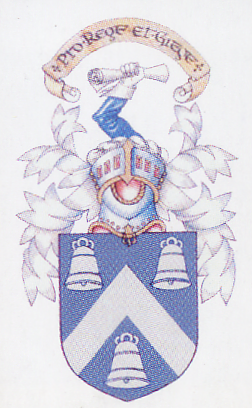Miss Craig left us just over a year ago and we little
thought then that class-rooms and cloisters would know her no more. The
days from October to February, when she was so ill, were dark indeed,
and the news of her passing brought a very poignant sense of
bereavement. We are left now with only pleasant, grateful memories of a
warm-hearted, very vivid human being and a treasured mental picture of a
fine woman of attractive build, with a small, eager, sensitive face,
pretty red hair, bright, lively eyes.
It is given to few of us to be so universally loved as
Miss Craig was. She was so human, so many-sided, so young. To me she
always seemed to carry about with her the tonic atmosphere of a Scottish
countryside.
She was indeed a child of the country. She loved the
country, loved to be out of doors, and was at her best and happiest
camping with Girl Guides. In one of her last letters, written in her
garden at Athelstaneford, she described touchingly and beautifully the
village sounds that reached her, the clanging of the anvil in a nearby
smiddy, the flowers around her, the birds pecking and hopping familiarly
close to her chair. Birds were her especial delight and care. Frequently
we saw her bring tenderly into Room III a bird with a broken wing. In
her schoolhouse garden, the tits, the robins, the blackbirds were all
her friends.
Temperamentally, she was as variable and interesting as
nature itself, reflecting as many moods. There were the laughter and
gaiety, bright as the sunshine, the energy and freshness, invigorating
as the breezes of her native East Lothian or of our own Fife Coast. She
had a strong sense of humour and was an entertaining raconteuse. How
amusing she could be, how cleverly she could mimic ridiculous people !
At times she bubbled over with merriment. But she was
easily stirred and tears of pity and sympathy came unexpectedly, as
April showers. There were storms, too, of indignation at some injustice,
dishonesty or hypocrisy. She could denounce and protest very
emphatically, she was herself so downright, honest and unaffected.
Academically, Miss Craig's bent was mathematical and
scientific, but she was versatile and was keenly interested in
literature and the arts. Her musical gifts served her well in her Girl
Guide activities. She had travelled extensively, liked foreigners and
foreign languages.
She was also versed in the domestic arts, ran her house
capably, cooked and baked well, was an excellent hostess, much given to
impromptu hospitality. You were always welcome ; she had al-ways just
baked a cake or made jam. There was always a spare bedroom for the
member of staff who lived out of town, or for the unhappy colleague
looking for lodgings.
She was sometimes quite femininely interested in dress.
Her toilette for a garden party at Buckingham Palace gave us all a
thrill of pride and pleasure.
In this very human individual of varying moods and
aptitudes, one virtue above all others shone steadfastly bright and
clear: the spirit of service. To every emergency in public and private
life her immediate reaction was practical helpfulness. To every worthy
cause she gave ungrudgingly her money, time and strength. When war came
she plunged into Red Cross work and in school made immense, successful
efforts for National Saving. She had the keenest interest in the most
unrewarding pupils and kept in touch with them long after they had gone
out into the world. Many intervals in school were sacrificed to the
bandaging of a sprained wrist or bleeding knee. In the streets one
constantly met her hurrying on some charitable errand. She never wearied
in well-doing. How impelling and urgent was her sense of duty to her
fellow-men and to her country, how unmistakably clear, how inescapable
to her was the call to service contained in our school motto:
'Pro rege et pro grege !
M. S. SANDERSON

